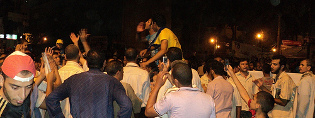Egypt (MNN) — Egypt's revolution is starting to go a little
stale.
It's that thought that had thousands protesting in the public squares
again Tuesday. Military
rulers warned demonstrators against violence as throngs of people expanded
their sit-in around government buildings.
On Monday, Egypt's Prime Minister offered a cabinet
reshuffle to pacify the crowds, but they remained unsatisfied and called for
the resignation of the entire Cabinet.
Dr. Rex Rogers with SAT-7 USA explains, "I think people
are just frustrated at the pace of change, primarily. I mean, there have been
things that have changed; things are moving in a direction that many of us
would hope."
The revolt began in January and February, and along with upheaval in Tunisia, Libya, Syria,
Jordan, Yemen and Bahrain, marked the the blossoming of democracy in the Middle East, or "Arab Spring." Egypt's lasted 18 days, ending with the
resignation of President Hosni Mubarak.
Five months later, there seems to have been little progress
in resolving the power struggles and delays of building a democracy, along with
the re-writing of a new constitution. A parliamentary election by September seems
like an impossible deadline.
Rogers says, "When you have young people, in particular–but
others as well–who want to see something altered that's been there for many
decades, then of course they get rather impatient." Many are calling for justice and are outraged
because they want to see certain leaders held accountable. "They're pushing for
trials; they're pushing for dismissals, some of which have happened in the last
week or two."
SAT 7, a Christian satellite television Ministry to the Middle
East and North Africa, has studios in Cairo. Just as they have in the past, the staff is responding to the turmoil around
them through their medium. Rogers says the team stays away from taking a
position on the politics, but "we continue to schedule more live programming. And we try to get Christian leaders up front on TV to talk about how to 'turn
the other cheek,' if that's appropriate."
Specifically, "We do try to encourage people to continue to
pray for peace, pray for resolution of conflict, and protection of all involved," says Rogers.
They're
also running through the basics of what it takes to be a follower of Christ and
a good citizen in hard times. Rogers
explains, "We're trying to help them think about what is their responsibility
as Christian citizens in the real world. They've never done this before. This is something
that the church has not been allowed, so how do you do this?"
As usually happens when there is anger and disillusionment,
there is also reflection. "There's
always the [tendency], when you're caught up in the immediacy, to think about the
eternal, to think about about whatever is happening, however
severe, it will pass. It will change…and
God is still there."
Pray for wisdom for SAT-7 staff as they continue to share the
hope and peace of Christ and provide answers. As they prepare new programs, they're asking: "How do we reach
people in this time period of more openness to people who are questioning their religious conviction and
their political attachments, [helping them] to think about who the Lord is…who is the God of
the Bible, who is Jesus Christ, and what can He do in their lives?"


